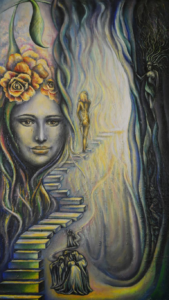Here’s another oldie, but goodie, from a few years back. Enjoy.
My parents have rented a vacation cabin on Lake Michigan. I’m playing by the shore and realize it’s getting dark. I look around. I’m alone. I begin walking along the water’s edge toward a distant pinpoint of light. Could that be my mother looking for me? How could she lose me? Will she find me? Will anyone find me? Will I have to live with a stranger? Will they feed me? Could something bad happen to me? After what feels like an eternity, Daddy and Jimmy come up behind me. Daddy explains. He and Mama left the beach separately, each believing I was with the other one. I’m safe, but I want Mama! Why didn’t she come for me? Doesn’t she know how afraid I’ve been? That I’d want her to look for me?
This is my earliest memory, described in more depth in my book, The Bridge to Wholeness. I was three. Something new was set into motion that evening. I had become conscious of my separate existence in a very big, dark, and scary world. In their book, Into the Heart of the Feminine, Jungian analysts Massimilla and Bud Harris write:
“…early infancy is the time when the world of the family begins imprinting itself on our tiny psyches, and this is a critical time in our emotional development. We know by now that much of a baby’s view of the world is filtered through the mother’s body and the emotional attitudes her body reflects. Of course this means that the child of a mother who is overly anxious or is resentful of the birth will feel out of adjustment psychologically, and such feelings will be the beginning of a negative mother complex. When we grow up this way, our personality will be founded on a deep sense of anxiety, scarcity, and a mistrust of the world. In contrast, if our mother is sufficiently gentle, loving, and emotionally secure, she will help us develop a basic sense of trust in life and in our place in the world.”
This memory resurfaced after last week’s post in which I described an example of how my mother complex influenced a relationship. Since practically everyone has mother issues of some sort—whether positive or negative, recognized or not—it seems appropriate to share more of what I’ve learned.
Every child experiences anxiety when it becomes aware of its individuality and vulnerability, and mothers vary in their ability to assuage this, our earliest wound. Good mothers are naturally gentle, patient, good-natured, affectionate, reassuring and loving. They make their children feel confident, safe and secure. Mothering can be more difficult for well-meaning women with mother complexes, jobs, other external stressors, or undeveloped “maternal instincts.” Nonetheless, a well-intentioned woman with a powerful desire to provide loving care and ongoing reassurance can be good enough at meeting her child’s basic physical and psychological needs.
Unfortunately, many mothers are too wounded, stressed, narcissistic or oblivious to give their children enough basic nurturance. Some are angry, jealous or resentful. Some are unstable, mentally ill or abusive. Some are not there.
My mother was more than good enough. Although anxious and emotionally fragile, she was kind, gentle and loving. I admired her, loved her, and felt loved in return. She tried hard to provide me with a safe and comfortable life, and I did feel safe until she and Daddy divorced and then he died. But when she was pregnant with me and throughout my childhood, Daddy was rarely home because he was having an affair. The strain of this plus her full-time job left her with little energy for me, physical or emotional.
I wasn’t neglected. Mama boarded women students from the nearby university in exchange for minimal rent and baby-sitting. But she was rarely available during my waking hours…and I missed her. As I grew older it got easier to lower my expectations and ignore my need for her. By the time Daddy died, I was proud of my independence and saw my ability to hide my hurt as a strength. But deep within, a three-year-old child still felt sad, lonely, deprived, and sorry for herself.







27 Responses
Oh goodness! As you probably know, I lost my dad in September, and have mostly lost my mum via dementia. One of the things coming up, amid the numbness that is not yet grief expressed, is serious mother issues that I am all at sea to understand and work through.
Dear Viv, I’m so sorry for your terrible losses. You have so much to mourn. I hope you will be able to soon. Massimilla and Bud say that allowing yourself to grieve fully is the only way to get over a mother complex.
One suggestion is to go way back to that sad and wounded child in active imagination and become her. Let her have her tantrums and voice her complaints and wail as long as she needs to……in her own true voice which she never got to use when she was a child. Of course, you’ll probably want to do this in private so you don’t scare anyone away. 🙂 Strong emotion is very intimidating to those who love us! Did I ever tell you, or write about the private adoption ritual I did with my inner Orphan child? It helped me see her more clearly when she showed up in hurt feelings, and it also helped me to see the Wise One within who can observe and love my Shadow unconditionally. This kind of inner work has been most helpful to me.
Anyway, just some thoughts. Everyone has their own processing to do and their own time to do it in. I wish you love and peace in your continuing journey to your beautiful, lovable, Self, my sister across the sea.
Warm blessings, Jeanie
If you did, I don’t recall it.
I’m loving all your reposts Jeanie! This one resonated deeply the first time I read it, and it’s amazing today as I reread my replies to you and reflect on my own mother complex, how far I’ve come in the past four years on this transforming and metaphoric journey we call life. In January this year I visited my mother in hospital for the 2nd time in eighteen years and we had a wonderful couple of hours reminiscing and during that time I read her my, “Dear Mother, Dear Father” http://theliberatedsheep.com/dear-mother-dear-father/ a poem I wrote two years ago which was a deeply healing experience.
I cannot find the words to describe this occasion and I haven’t seen her since but somehow in that time the last traces of anger and hurt, dissolved into love, light and laughter. And in my dreams, different mothers came and a new kind-hearted relationship within them began. Oh, and I can highly recommend the book you mention by Massimilla and Bud Harris! I got myself a copy as soon as I read your original article. It’s proved to be one of the best Jungian books on the Death Mother Archetype I’ve read so far. Thank you so much for reposting this! Warm autumnal blessings, Deborah.
Thank you, Deborah. I repost old, well-received pieces from time to time for newer readers who’ve never seen them. But I worry sometimes that readers who’ve followed me for a long time might not enjoy them as much the second time around. So it’s been really good to see that they are as welcome today as they were then. I’ve really enjoyed re-reading your comments too. It brings back warm memories of things forgotten as well as reassuring new insights into how we’ve all changed over time. I will re-read your poem, “Dear Mother, Dear Father,” as soon as I finish this.
I’m thrilled to know of your warm reunion with your mother. What an amazing healing you’ve managed to obtain for yourself! And I know without a doubt that it was healing for her as well. Forgiving her and letting her know is a most precious gift for a daughter to give her mother. Motherhood is so idealized and difficult that most of us suffer terrible guilt throughout our lives for things done and undone in our youthful ignorance.
I suspect you already know that a negative mother complex is about the most difficult wound of all to heal. It’s a truly extraordinary accomplishment that points to great courage, dedication, wisdom, depth, and, most of all, love. Well done, dear sister. You and your work are an inspiration to us all. Warm blessings, Jeanie
P.S. Deborah, I’ve just read your exquisite poem, “Dear Mother, Dear Father.” Wow! The love and tenderness and healing and forgiveness in it…..it brought me to tears. This is a healing poem. A mothering and fathering poem. A love poem. It brings together the pieces of my own childhood mirrors that have been scattered to the winds of pain and error and guilt and time, and tenderly says to each piece as it returns, wounded, limping, and humbled, “Welcome home. You are safe now. I love you.” Thank you.
Your reply comes to me in the form of a poem itself! Just beautiful. Your generous and kind-hearted words mean so much, thank you Jeanie! To read that particular poem to my mother at the start of this year was a truly incredible moment in my life. Oh how my heart sang the sweetest song! What a healing and truly humbling experience meeting the Mother Wound continues to be!
The added bonus of reading your rich and insightful posts are the depth and divinity shared in the replies you receive, adding greatly to joy I feel whenever I read your words! Oh, and I just love the sound of that adoption ritual for your inner child. I’ve said it before and I’ll say it again, you’re my inspiration and spurs! Love and light, Deborah.
This is my favorite blog yet! Felt the call to change my mental health practice the other day during the Terminator movie no less. I feel I need to take on more of a mothering role to women who have been neglected or feel abandoned by their mothers. Your blog felt like a confirmation to excavate more within me in order to better serve other women.
Hello Denise. I’m so glad to know you loved this piece. It confirms my intuition that this would be a good one to repost!
I love it that you felt the call to change your mental health practice during a Terminator movie!! This experience speaks so beautifully to the power of archetypal stories to elicit powerful and valuable psychological change. There are many mythic elements in that series that speak to the soul, and most people never really stop to think about them or apply them to their own souls and listen to the inner guidance that comes from them. As you obviously already know, choosing to act on these new insights is how psychological and spiritual growth happens. Well done!
Thank you so much for letting me know how this post confirmed your inner guidance. This is a meaningful synchronicity for me as well as for you. And thank you for writing to let me know. Warmest blessings, Jeanie
This post resonates with me as I did not have a good relationship with my mom. Mom had a lot going on in her life as she was nursing her dying mother of cancer when mom was pregnant with me. A lot of trauma took place in those years and therefore I never connected with mom. Now, after years of therapy, I understand the issues, and I wish I could talk to my mom and work out our differences, but maybe she still wouldn’t listen.
I have had a difficult life and I have been very much a loner, yet I am social and crave connections thus my walks around the Poulsbo waterfront chatting with people and petting their dogs. Now, at 70 the real me is coming out.
“…I wish I could talk to my mom and work out our differences, but maybe she still wouldn’t listen.” This makes me want to ask you if you’ve ever tried active imagination of the kind I mentioned to Viv in my response to her letter above. Therapy is such an excellent and wise choice. I’m so glad to know you understand the issues now. In my experience, this is crucial to the healing process.
Sometimes, though, understanding isn’t enough to complete the healing. There’s more you can do if you still feel the need to talk to your mother. You can work through the emotional aspects of your mother issues by carrying on an imaginary conversation with her in a ritualized space and way. You take both roles. You set a place for your mother, another for your child, and then a third place for yourself where you watch and listen. First, you sit in your child’s place and speak her truths and express any feelings she needs to release. When she’s finished, you take your mother’s place. You voice her truths and feelings and allow her to speak for as long as she needs to. Then you, the wise observer, summarize what you’ve seen and heard, and give respectful thanks to them both for being honest. Maybe you can share new insights with both that are helpful to both. Then end with a blessing. You can record this in your journal if you want to. You might like to revisit it some day. You can do this many times, for as long as it takes, until you feel an inner shift taking place.
I’m glad to hear the real you is coming out. The same thing is happening to me. Some of us take much longer than others! Perhaps those of us who take this longer path are mostly introverted, intuitive, feeling types? I certainly am.
Thank you for writing, Gwyn. Warm blessings to you, Jeanie
Thanks Jeanie for your response. Yes, I am introverted, intuitive, and feeling. My parents did NOT believe in therapy. I have a hard time even imagining a conversation with mom as I think she would throw up a wall. There was a lot of trauma in our home as my younger brother was highly intelligent, rebellious, and Gay. My parents could NOT deal with him and I spent my life as the middle-man/peacemaker, but they NEVER accepted him. My brother and I were friends. He had quite a life as he also became a Buddhist monk. I wrote about him on my blog, Gwynnsgritandgrin, an older story in my family section called “Acceptance.”
That sounds really tough. Thank goodness you overcame your parents’ taboo and sought therapy for yourself. How terribly sad that they rejected your brother for being gay. What a burden of grief and shame you both bore growing up. I’m so sorry. I’m very interested in reading your story about him. I’ll be out the rest of the day but will check it out when I can. Peace and warmest blessings. Jeanie
Jeanie ~ In retrospect, I’ve come to see both my mother’s failures and denial, as well as my unrequited longing for her and for the truth of it to be revealed and acknowledged (something that never happened while she was alive), as being “the blessing in the curse” (Daniel Deardorff). If the dragon in me still sometimes fights too hard, hoping to open minds and hearts and to change the world so that ‘others’ won’t suffer far worse fates, then at least I understand the source of the fire that fuels my will-full illusion. I say this understanding each of us must come willingly.
Though I made peace with my mother long ago, it was never really about that. She was only the first story in a long line of repeating stories God (as both Mother and Father) has used to break open my heart and humble me, and to slowly dissolve my resistance to the ongoing pain, disillusionment, but also freedom truth brings. My longing for Love has become my only home. Everywhere else, and in every other endeavor, I’m a fraud.
The waking dream your child-self once had, of feeling lost and abandoned at the edge of the sea (or ‘see’) and of being mysteriously drawn to the distant light barely visible on the other side of the great abyss, is very beautiful and telling. Metaphorically, it describes our search for something greater than ourselves, the mysterious something or someone who will never abandon us, and for the infinite, which can only be known when we venture into and beyond the great Neptunian sea of illusion and separation. Most children’s psyches are still open to the transcendent, in ways adult minds and egos have forgotten and are more likely to dismiss or misuse.
“My longing for Love has become my only home. Everywhere else, and in every other endeavor, I’m a fraud.” These are powerful and brave words, LB. They resonate deeply with me.
Yes, I see the metaphorical meaning behind my earliest memory too. And in my Lone Ranger dream at ten. In fact, I see the meaning behind all the incidents, dreams, and memories I have chosen to write about as more developments in my own story. It’s been a conscious exercise in what Jung referred to as “remything” my life. Digging beneath the surface to find the archetypal forces beneath surface manifestations has brought up unimagined treasures that continue to sustain me.
It’s revealing to look back at the events and dreams that have shaped our lives and childhoods. One of my strongest early memories is of a ‘big’ (recurring) dream I started having when I was around 6 or 7, in which the sun grows dark and stars fall from the sky.
I don’t know why but decades later, when I was in my twenties, I decided to share my (still) recurring dream with an American Indian friend who was studying to become a pastor and return to the reservation she’d grown up on. She told me it was a dream various members of her community had had over the years, so it was immediately familiar to her. Three decades after that, I finally made the conscious connection between my dream and Matthew 24:29, and within that context began to understand the dream’s symbolism.
The last time I had the dream was maybe ten years ago, and some of the details had changed. This time I wasn’t alone in witnessing the celestial events. I was with a small child, and both of us were wearing gas-masks. Something else had changed too. I was less passive observer and more aware of the need to protect my fragile, young friend from this new, invisible threat. Mask, persona?
Astrologically, I associate Neptune (the planet of glamour, denial, illusions and deception) with poisonous gases. Neptune has lovely transcendent qualities as well, though I see the gas masks as more of a warning. Or so I think. If ever I dream the dream again, I’m open to receiving edification in future versions.
After I left my response, it occurred to me that at several points over the past few years we’ve had to wear protective face masks because of poor air quality caused by fires and wind. As a precaution, there have also been mandatory power outages, sometimes lasting for days.
My husband and I are among the lucky ones. People have suffered much worse. It’s a dystopian future I could’n’t possibly have imagined as a child.
Maybe my dream also glimpsed a future online world where words are measured by stars labeled “Like” and what it would mean to be without them. It’s another layer of the dream I hadn’t considered until now.
Message received, thanks Jeanie, for clarifying what both of us already knew. Take care.
Dreams contain the secrets of the unconscious. Unraveling their meaning for us can lead us to conscious, mindful, and artful living during our time on this planet. Take care.
Don’t know if you remember or not, but it was my dream’s beautiful blue hummingbird that first led me here.
I left my first comment in response to your post about the shaggy black and white dog in the road and dead hummingbird on your porch, found later, when you returned home. I recognized as my own the small cracks in your facade and in your certainty and was drawn in by the liminal space created by that brief opening. Hummingbirds are such fragile creatures. They fly low, never in flocks, and live relatively brief, solitary lives.
I would love to read your post when you first posted it Jeanie, to see if I commented then and what I said then – to see if my view has changed in any way. I had a good enough mother in hindsight, though she and my father were poles apart in type and temperament which effected it own woundings on me. We were never close though right from the beginning. She said when I asked her in adulthood and was exploring psychological issues, that I rejected her breast from the moment I was born … It was only MUCH later that I looked at this another way and thought: huh? A baby doesn’t reject its mother – maybe it was the other way around?
I have a memory from when I was about 4 walking on a beach a long way behind my parents and feeling a sense of abandonment and wondering why they weren’t with me, or I with them. But then somehow I was lifted up and flew across the sands and I was with them. Strange – but somewhat comforting.
Too many of us suffer unconsciously from the Dead Mother or absent mother syndrome. What better way to come to true maturity and integrity than to do the excavating, do the digging, do the hard work in uncovering the wounds and also ensuring that one does not pass any baggage onto offspring or future generations –
I look on my parents with deep love and affection even though they are long dead, yet of course still alive in me.
Thank you 🙂
Hi Susan, To find the original post, go to September, 2015 in the archives in the green panel to the right of this page and scroll through until you come to September 22. It’s been fun for me to re-read everyone’s comments and my responses.
Your childhood memory of walking on the beach and being lifted up and flying across the sands to your parents is amazing and delightful. It makes me wonder if someone else in your family saw you straggling behind and came up behind you and swept you up and “flew” you to them! It would have certainly felt like flying to a child to be swept up like that. But who cares if there’s a logical explanation or not! It was true from your little girl perspective, and a magical experience all around! 🙂
I guess the reason so many people suffer from the Dead or absent mother syndrome is because they have no idea that their mother has anything to do with their present suffering, which, on the surface, appears to be totally unrelated. These things are buried so deeply in our childhood that it can take years to excavate them. It certainly took me a long time to figure that out. We adapt as best we can as children, and rationalize whatever we need to to feel comforted and safe. Or find substitutes that we can safely mourn the loss of…..like a beloved blankie that the dog ate, or the pet that got run over by a car. Some years ago I was shocked to realize that for me, my horse was a mother substitute! He gave me all kinds of love and comfort and attention and support that I always wanted from my mother. Who knew? 🙂
Thank you for pointing me in the right direction Jeanie to your Sep 22 2015 post. I was amazed to see my response then is very similar to what it is now! A little consistency goes a long way – And, I also noted this time round (Nov 2019) when reading it afresh, that your early experience is similar in a way to mine, though I didn’t comment.
I buried myself in books from an early age – Knots by RD Laing made a strong impression on me later in my teens.
As you know, my mother was missing in action emotionally, especially after my father’s death when speaking his name or expressing grief was taboo. (Interesting that I weep so easily now.) Last week, digging through two dreams that spoke of secrets, I came to a place of shame about vulnerability the last few years–and my hidden desire to hide that I’m struggling. In the session with my dream therapist, I said, “Iva wouldn’t like that.” Iva was my mom’s name and I got it as I said it. The secret mother in me who has no tolerance for the hurting child. Thank you, Jeanie, for helping me dig a little deeper.
Yes, our mothers were a lot alike. I, too, developed a very stoic, independent Warrior as a result of my mother’s model. Acknowledging the hurting child beneath that Warrior can be extremely difficult. My Warrior always hated whining and excuses and self-pity. So when does our hurting child get to feel what she really feels?
When I realized this I decided to give my Warrior a new job. Now his/her job is not to push the suffering child away, but to turn around, look her lovingly in the eye, say, “I love you and I will protect you,” then pick her up and hold her, support her, and protect her from the criticism that comes from the ego people outside of ourselves. When your Warrior mothers your child, it becomes easier to accept that your human mother couldn’t! 🙂
Blessings on your ongoing journey, dear Elaine.
Turning toward our suffering or any suffering with love and kindness is the only way. I love what Marion Woodman said in her last message to me: “Let the warm love flow.”
She always knew how to say it best!